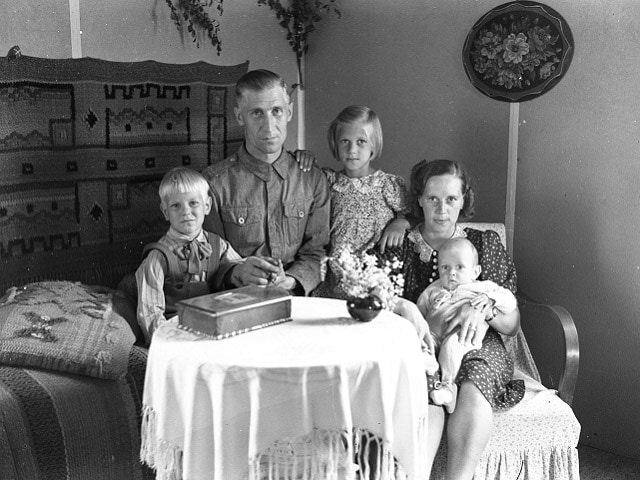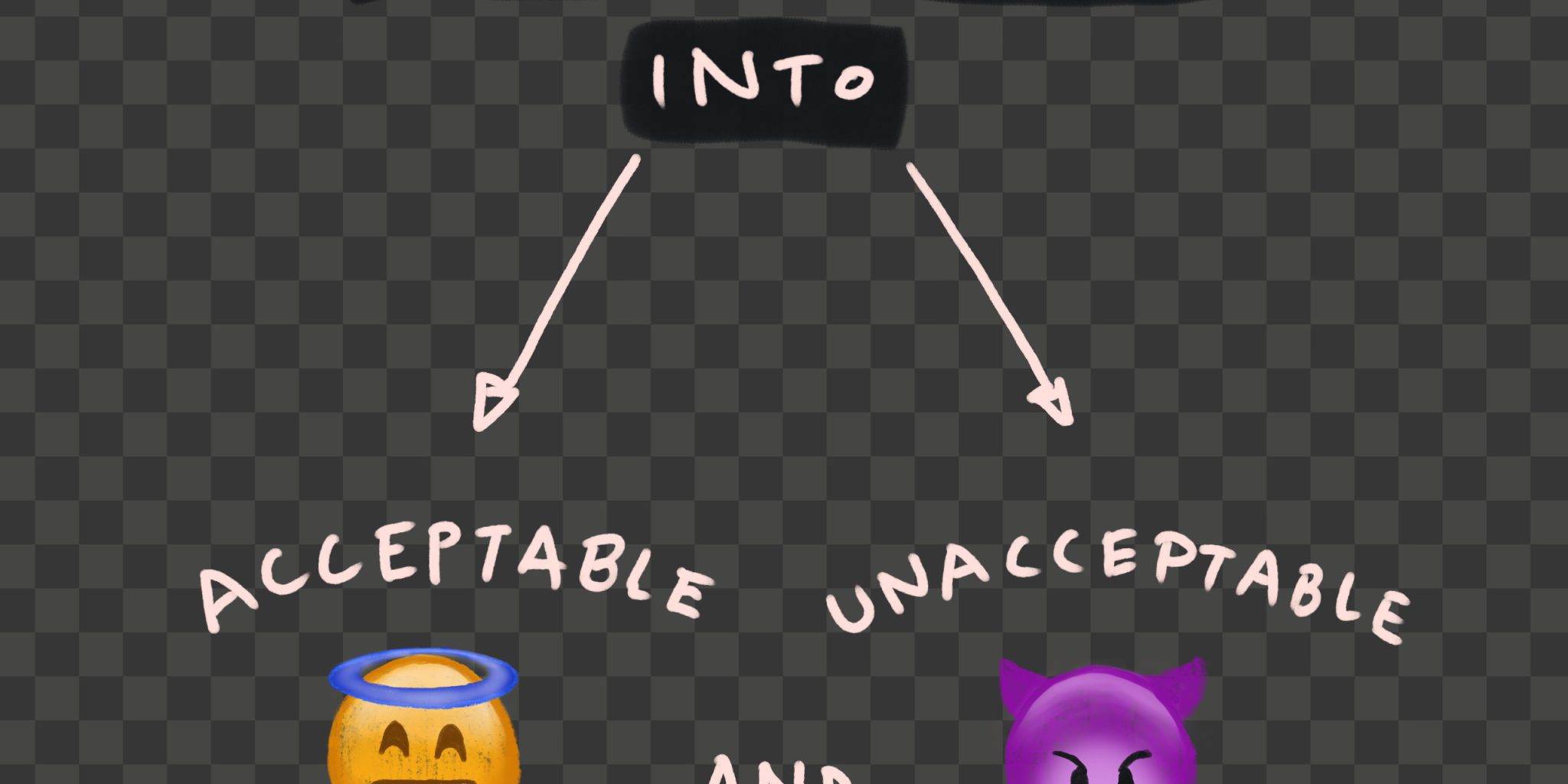Image header: Angela Sevin, CC BY-NC 2.0
If you’re tuning in just now, please read Part 1 to get the context.
Born into social norms that dictate the way we live life, we were taught through our parents what was acceptable and what was unacceptable. By a system of rewards, judgments, invalidations, and punishments, we were conformed to concepts and expectations, and suppressed our own thoughts, emotions, needs, and experiences.
When our parents reflected back to us that it wasn’t safe to be ourselves, we learned to hide ourselves. We received the message that we were not worthy of being heard, trusted, or loved as we were. Consequently, we split ourselves into a presentable mask and an unwanted shadow.
Over time, we began to internalize our parents’ voices and to judge and treat ourselves in their place.
By having to prioritize our parents’ expectations and needs over our own, we eventually lost our centeredness. Basically, we lost ourselves. The disconnection from our spiritual core made us prone to becoming preoccupied with how our parents or others see us, which again made us vulnerable to being objectified and instrumentalized by them.

Image: Mauno Mannelin and family

Image: Obra Shalom Grande, CC BY-ND 2.0
Objectification is a concept that has its original roots in the writings of Kant. In recent years, this term has been used by feminists in relation to women not being treated as full human beings with full dignity, but as (sex-) objects to be manipulated and controlled by men. But if an adult woman can be objectified, it is only because the disconnection that underlies objectification has already occurred. Objectification in childhood is the soil for sexual objectification. Broadly speaking, objectification is a process by which a human being, child or adult, is denied their subjectivity or becomes an instrument for the purpose of the objectifier.
In such interactions, the objectifier often exploits power relations, and the objectified – i.e. the individual who has been exposed to objectification – is forced into submissive roles, making them feel powerless and inferior. Thus, objectifying an individual dehumanizes them by reducing their humanity into parts or functions that serve the specific goals and functions of the objectifier.
Through the process of internalization, objectified individuals may undergo a process of self-objectification (versus objectification directed outwards), a phenomenon in which they adopt others’ perspectives on themselves and perceive themselves as instruments to satisfy the needs and desires of others. Thus, self-objectification is defined as a state in which an individual moves from a subjective sense of self to a sense of self as an object.
Objectification reflects the loss of the subjective sense of self.
According to Martha Nussbaum, a person is objectified if one or more of the following properties are involved:
- Instrumentality – treating the object as a tool for the objectifier’s purposes
- Denial of autonomy – treating the object as lacking in autonomy or self-determination
- Inertness – treating the object as lacking agency or activity
- Fungibility – treating the object as interchangeable with (other) objects
- Violability – treating the object as lacking in boundary integrity, “as something that it is permissible to break up, smash, break into.”
- Ownership – treating the object as if it could be owned, bought, or sold
- Denial of subjectivity – treating the object as if there was no need for concern for their experiences or feelings
In brief, objectification reflects the loss of the subjective sense of self.
The idea of objectification and ownership of children is very difficult to talk about. Most of the time, it is hard to break it to parents as they are the ones who are the objectifier, but at the same time, they are the only ones in a position to break the cycle of hurt. However, it is understandable that parents get highly defensive. Most parents have good intentions and have gone to great lengths to provide for their children the best they have to offer. Parents dissociate and rationalize what happened to them when they were children. Reconnecting with the hurt inner child is the key to breaking the cycle of hurt in which the hurt gets passed down unconsciously from generation to generation, giving way to objectification and dehumanization of children.
Objectification may lead to negative feelings of inferiority, powerlessness, and severe self-devaluation, all of which characterize shame. A sense of shame, which may be manifested with regard to one’s body, personal characteristics, or behavior, involves an exaggerated level of self-consciousness in which the self is perceived as faulty and inadequate.
After all, objectification is regarded as another form of dehumanization.

Image: simpleinsomnia, CC BY 2.0
Disconnection from self causes us to outsource our worth, our knowing, our reality. This codependency conditioning puts our emotional state in the hands of another person.
How they feel about us becomes how we feel about ourselves.
This conditioning shaped our understanding of ourselves and the world. It is what created a disconnect, a loss of our integrity and authority over our own body and mind.
We become a human performance. An avatar of a person we believe should receive love. Betraying parts of ourselves, we create a shadow self. The shadow self is parts of us we deny. Denial causes suffering. So many of us have “social anxiety” or “general anxiety” because on a spiritual level we are deeply disconnected from our true initiative state. From our authentic self.
Instead, we are completely identified with the ego— the thought patterns of the mind. The ego creates stories based on our early trauma. Like a broken record, it speaks about comparison, lack, and judgment. This tape plays in our mind all day long. Lost in thought, we are our thoughts. We are sleepwalking. In an unconscious autopilot, re-creating past dynamics in the present.
Our work is to expand our consciousness. Consciousness is simply awareness. It’s observing (without judgment) like a curious student of self. What do I think? How do I speak? How do my relationships make me feel? How do I respond when I’m triggered? What behavioral patterns do I have?
This is the journey of returning home. The integration of mind, body, and spiritual core that we lost as children raised by wounded humans who lost their own connection to self.
You may also like
The dualistic split in childhood hurt we all had to endure
Can you identify the aspects of yourself that were accepted…
The driving force behind human conflict
You could ask anyone if they desire peace and harmony, and…
Looking at the stars is a look back into a distant past
Did you know that looking at the stars is a look back in…




